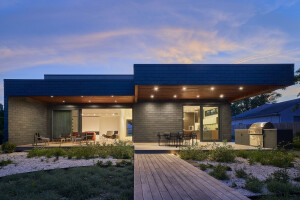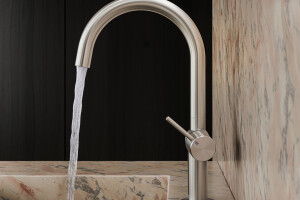The guest facilities for this biotope, an increasingly popular man-made swimming pool featuring natural water-cleaning technology, uses the original building of a former agricultural collective farm. The guest facilities have been built into former garages once used to house agricultural machinery. Wekept the old reinforced-concrete prefab structure with its ornamental ribbed ceiling, while the area between the columns now serves as a space for refreshments, a cafeteria, sports equipment rental, and sanitary facilities. The whole structure can be easily opened to all sides thanks to large gates embedded into the support modules. When the gates are shut, the façade still works as a semi-permeable filter between the interior and exterior.
For the masonry we recycled the old bricks that were used to build the original garages back in 1962. All bricks were made in local brickyards and despite their renown as high-quality products, their manufacture has ceased to exist. Wash troughs, showers and lavatories are from stainless steel are adjusted to fit the camp requirements. Installations are visible, and the space is illuminated by diffused light reflecting off the ceiling. Ventilation is natural. The materials used, the details and the structure itself help to create an informal and fresh atmosphere throughout the whole swimming pool area.
The Honětice farmstead has always been a part of the nearby castle in Zdislavice. After World War II, the estate was nationalized and during the Communist-era collectivization period, the layout of the former courtyard was altered. Two main barns were demolished and garages for agricultural machinery were attached. After many years of falling into disrepair, this farm was left in a desolate state. For the past five years the reconstruction ofthe whole complex and its transformation into a new agro-tourism site has been carried out. While it was impossible to restore the original agricultural function of the farmstead, it is possible to revive its social importance. For centuries it played an essential role for the locals and the village.





























![N10-house [ House with View terrace ] N10-house [ House with View terrace ]](https://archello.com/thumbs/images/2018/01/31/01MG0863.1517363619.629.jpg?fit=crop&w=300&h=200&auto=compress)










